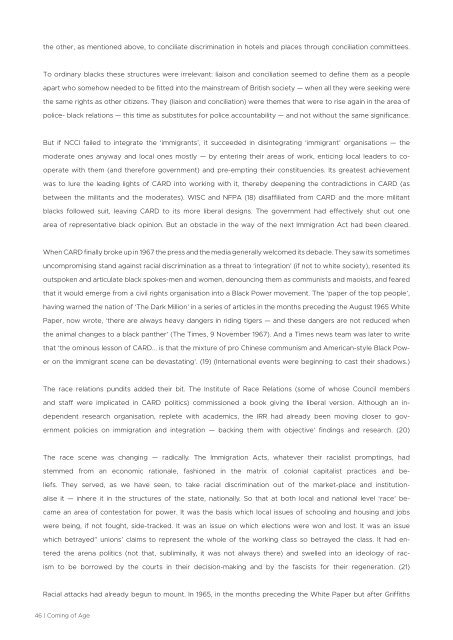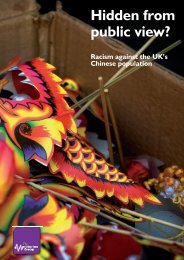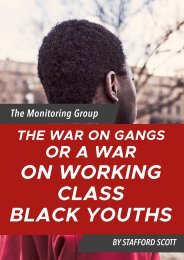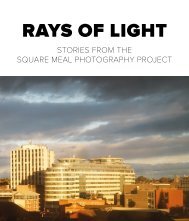Coming of Age : 1976 and the Road to Anti-Racism
Coming of Age : 1976 and the Road to Anti-Racism by Jagdish Patel and Suresh Grover
Coming of Age : 1976 and the Road to Anti-Racism
by Jagdish Patel and Suresh Grover
You also want an ePaper? Increase the reach of your titles
YUMPU automatically turns print PDFs into web optimized ePapers that Google loves.
<strong>the</strong> o<strong>the</strong>r, as mentioned above, <strong>to</strong> conciliate discrimination in hotels <strong>and</strong> places through conciliation committees.<br />
To ordinary blacks <strong>the</strong>se structures were irrelevant: liaison <strong>and</strong> conciliation seemed <strong>to</strong> define <strong>the</strong>m as a people<br />
apart who somehow needed <strong>to</strong> be fitted in<strong>to</strong> <strong>the</strong> mainstream <strong>of</strong> British society — when all <strong>the</strong>y were seeking were<br />
<strong>the</strong> same rights as o<strong>the</strong>r citizens. They (liaison <strong>and</strong> conciliation) were <strong>the</strong>mes that were <strong>to</strong> rise again in <strong>the</strong> area <strong>of</strong><br />
police- black relations — this time as substitutes for police accountability — <strong>and</strong> not without <strong>the</strong> same significance.<br />
But if NCCI failed <strong>to</strong> integrate <strong>the</strong> ‘immigrants’, it succeeded in disintegrating ‘immigrant’ organisations — <strong>the</strong><br />
moderate ones anyway <strong>and</strong> local ones mostly — by entering <strong>the</strong>ir areas <strong>of</strong> work, enticing local leaders <strong>to</strong> cooperate<br />
with <strong>the</strong>m (<strong>and</strong> <strong>the</strong>refore government) <strong>and</strong> pre-empting <strong>the</strong>ir constituencies. Its greatest achievement<br />
was <strong>to</strong> lure <strong>the</strong> leading lights <strong>of</strong> CARD in<strong>to</strong> working with it, <strong>the</strong>reby deepening <strong>the</strong> contradictions in CARD (as<br />
between <strong>the</strong> militants <strong>and</strong> <strong>the</strong> moderates). WISC <strong>and</strong> NFPA (18) disaffiliated from CARD <strong>and</strong> <strong>the</strong> more militant<br />
blacks followed suit, leaving CARD <strong>to</strong> its more liberal designs. The government had effectively shut out one<br />
area <strong>of</strong> representative black opinion. But an obstacle in <strong>the</strong> way <strong>of</strong> <strong>the</strong> next Immigration Act had been cleared.<br />
When CARD finally broke up in 1967 <strong>the</strong> press <strong>and</strong> <strong>the</strong> media generally welcomed its debacle. They saw its sometimes<br />
uncompromising st<strong>and</strong> against racial discrimination as a threat <strong>to</strong> ‘integration’ (if not <strong>to</strong> white society), resented its<br />
outspoken <strong>and</strong> articulate black spokes-men <strong>and</strong> women, denouncing <strong>the</strong>m as communists <strong>and</strong> maoists, <strong>and</strong> feared<br />
that it would emerge from a civil rights organisation in<strong>to</strong> a Black Power movement. The ‘paper <strong>of</strong> <strong>the</strong> <strong>to</strong>p people’,<br />
having warned <strong>the</strong> nation <strong>of</strong> ‘The Dark Million’ in a series <strong>of</strong> articles in <strong>the</strong> months preceding <strong>the</strong> August 1965 White<br />
Paper, now wrote, ‘<strong>the</strong>re are always heavy dangers in riding tigers — <strong>and</strong> <strong>the</strong>se dangers are not reduced when<br />
<strong>the</strong> animal changes <strong>to</strong> a black pan<strong>the</strong>r’ (The Times, 9 November 1967). And a Times news team was later <strong>to</strong> write<br />
that ‘<strong>the</strong> ominous lesson <strong>of</strong> CARD... is that <strong>the</strong> mixture <strong>of</strong> pro Chinese communism <strong>and</strong> American-style Black Power<br />
on <strong>the</strong> immigrant scene can be devastating’. (19) (International events were beginning <strong>to</strong> cast <strong>the</strong>ir shadows.)<br />
The race relations pundits added <strong>the</strong>ir bit. The Institute <strong>of</strong> Race Relations (some <strong>of</strong> whose Council members<br />
<strong>and</strong> staff were implicated in CARD politics) commissioned a book giving <strong>the</strong> liberal version. Although an independent<br />
research organisation, replete with academics, <strong>the</strong> IRR had already been moving closer <strong>to</strong> government<br />
policies on immigration <strong>and</strong> integration — backing <strong>the</strong>m with objective’ findings <strong>and</strong> research. (20)<br />
The race scene was changing — radically. The Immigration Acts, whatever <strong>the</strong>ir racialist promptings, had<br />
stemmed from an economic rationale, fashioned in <strong>the</strong> matrix <strong>of</strong> colonial capitalist practices <strong>and</strong> beliefs.<br />
They served, as we have seen, <strong>to</strong> take racial discrimination out <strong>of</strong> <strong>the</strong> market-place <strong>and</strong> institutionalise<br />
it — inhere it in <strong>the</strong> structures <strong>of</strong> <strong>the</strong> state, nationally. So that at both local <strong>and</strong> national level ‘race’ became<br />
an area <strong>of</strong> contestation for power. It was <strong>the</strong> basis which local issues <strong>of</strong> schooling <strong>and</strong> housing <strong>and</strong> jobs<br />
were being, if not fought, side-tracked. It was an issue on which elections were won <strong>and</strong> lost. It was an issue<br />
which betrayed” unions’ claims <strong>to</strong> represent <strong>the</strong> whole <strong>of</strong> <strong>the</strong> working class so betrayed <strong>the</strong> class. It had entered<br />
<strong>the</strong> arena politics (not that, subliminally, it was not always <strong>the</strong>re) <strong>and</strong> swelled in<strong>to</strong> an ideology <strong>of</strong> racism<br />
<strong>to</strong> be borrowed by <strong>the</strong> courts in <strong>the</strong>ir decision-making <strong>and</strong> by <strong>the</strong> fascists for <strong>the</strong>ir regeneration. (21)<br />
Racial attacks had already begun <strong>to</strong> mount. In 1965, in <strong>the</strong> months preceding <strong>the</strong> White Paper but after Griffiths<br />
46 | <strong>Coming</strong> <strong>of</strong> <strong>Age</strong><br />
<strong>Coming</strong> <strong>of</strong> <strong>Age</strong> Final version 16.10.indd 46 17/10/2017 12:07







